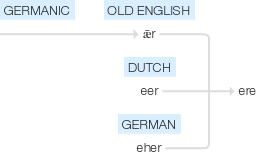Ere
Old English ǣr, of Germanic origin; related to Dutch eer and German eher .
wiktionary
From Middle English er, from Old English ǣr (adverb, conjunction, and preposition), from Proto-Germanic *airiz, comparative of Proto-Germanic *airi(“early”), from Proto-Indo-European *h₂éyeri(“day, morning”) (compare Avestan 𐬀𐬫𐬀𐬭 (ayar, “day”), Gk. ἠέριος(ēérios, “at daybreak”), see also era, Albanian herët(“early in the morning, at daybreak”) ). The adverb erstwhile retains the Old English superlative ǣrest(“earliest”). Cognate with Saterland Frisian eer(“before”), Dutch eer(“before, sooner than”), German eher(“earlier”).
ere (plural eres)
etymonline
ere (prep.)
c. 1200, from Old English ær (adv., conj., & prep.) "soon, before (in time)," from Proto-Germanic *airiz, comparative of *air "early" (source also of Old Saxon, Old Frisian, Old High German er, Dutch eer; German eher "earlier;" Old Norse ar "early;" Gothic air "early," airis "earlier"), from PIE *ayer- "day, morning" (source also of Avestan ayar "day;" Greek eerios "at daybreak," ariston "breakfast"). The adverb erstwhile retains the Old English superlative ærest "earliest."
